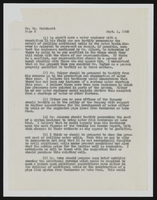Search the Special Collections and Archives Portal
Search Results
Ida Webb oral history interview
Identifier
Abstract
Oral history interview with Ida Webb conducted by Claytee D. White on February 29, 1996 for the African Americans in Las Vegas: a Collaborative Oral History Project. In this interview, Webb discusses her childhood in the American South. She discusses her family's move from Tallulah, Louisiana to McNary, Arizona, and then their migration to Las Vegas, Nevada. Webb shares her experiences as a young African American mother in Las Vegas in the 1940s and the things her and her husband did to provide for their family. She shares her views on her marriage and her views on African American culture of the time. Webb discusses her husband's civic involvement and his job at the Las Vegas Sun. She details her experiences working in the hospitality industry for such early casinos as the El Rancho Hotel & Casino, The Flamingo Hotel & Casino, and the Last Frontier Hotel & Casino. She shares her own civic involvements and her participation in the Culinary Workers Union Local 226.
Archival Collection

Erika Castro interview, November 12, 2018: transcript
Date
Archival Collection
Description
Interviewed by Maribel Estrada Calderón. Barbara Tabach and Laurents Banuelos-Benitez also participate in the questioning. Erika Castro was born in Mexico City in 1989. At the age of three, she migrated with her family to the United States. She remembers entering Kindergarten without knowing how to speak English. She graduated from the College of Southern Nevada. Castro has since been a political activist. Subjects: PLAN, Planned Parenthood, Environmental Justice, UndocuNetwork, Deferred Action for Childhood Arrivals, DREAM Act
Text
Sarann Knight Preddy oral history interviews
Identifier
Abstract
Oral history interviews with Sarann Knight Preddy conducted by Claytee D. White on June 05, 1997 and March 11, 1998 for the Women's Research Institute of Nevada (WRIN) Las Vegas Women Oral History Project. Preddy begins her interview by discussing her upbringing in Oklahoma. Preddy then talks about moving to Las Vegas in 1942 and her first job at the Cotton Club. She then discusses moving to Hawthorne, Nevada, buying her club, the Lincoln Bar, and working for the local chapter of the National Association for the Advancement Colored People (NAACP). Preddy also talks about gaining gaming licenses for her establishments and about the migration patterns of the African American community in Nevada. She describes the Westside community, education, and prejudice in Las Vegas, Nevada. Lastly, Preddy describes important places and people in the Las Vegas community.
Archival Collection
Rossi Ralenkotter oral history interview
Identifier
Abstract
Oral history interview with Rossi Ralenkotter conducted by Claytee D. White on August 4, 2022 for the Boyer Early Las Vegas Oral History Project. In this interview, Ralenkotter describes migrating to Las Vegas, Nevada in 1951 with his parents at the age of four. He shares early memories of the city, and talks about how it brought him to be president and CEO of the Las Vegas Convention and Visitors Authority (LVCVA). Ralenkotter is responsible for marketing and branding Las Vegas and Southern Nevada as the world's most desirable destination for leisure and business travel. Under his leadership, the LVCVA launched the most successful branding campaign in tourism history, "What Happens in Vegas, Stays in Vegas." In 1971, Ralenkotter earned a master's degree in Business Administration from the University of Nevada, Las Vegas (UNLV) and in 2008 was selected as Alumni of the Year. In 2009, he was honored with UNLV's Distinguished Nevadan Award. Throughout the interview, Ralenkotter recalls his many memories of the city throughout his life, including cruising Fremont Street, swimming at Lorenzi Park, participating in Helldorado parades, and watching the transformation of sports in the city.
Archival Collection

Black Entertainers in Las Vegas: 1940 - 1960
Date
Description
Essay by Roosevelt Fitzgerald reflecting on black entertainers during the early days of the Las Vegas Strip, dated 1988.
Text

James A. Gay III interview, 1973: transcript
Date
Archival Collection
Description
Interview with James A. Gay III conducted by Joyce M. Wright in 1973. Edited by Elizabeth Nelson Patrick, and transcribed for the project "Black Experience in Southern Nevada, Donated Tapes Collection," James R. Dickinson Library, University of Nevada, Las Vegas, December 1978. Arriving in 1946 from Fordyce, Arkansas, Gay became the first African-American mortician in Las Vegas. He later worked as Assistant Manager of the Sands Hotel and Casino and Union Plaza while serving as an executive board member of the Culinary Union. Instrumental in the Las Vegas community, Gay worked to improved race relations, addressing social, economic, and civic issues. Gay was awarded an honorary degree from the University of Nevada, Las Vegas in 1988.
Text
Duncan, Katherine
Katherine Duncan was born in Ratio, Arkansas. Her parents, who were sharecroppers, and her 11 brothers and sister migrated to Boston in the winter of 1969. She moved to Las Vegas on July 7th, 1977 and started working at the MGM Grand Hotel. She also worked with the Nevada Motion Picture Services, at her own travel agency, and at the Riviera Resort and Casino. She started a black heritage tour of Las Vegas.
Person
Barbara Jean Drew oral history interview
Identifier
Abstract
Oral history interview with Barbara Jean Drew conducted by Claytee D. White on May 17, 2021 for African Americans in Las Vegas: a Collaborative Oral History Project. Barbara Drew is the Dean of the Academy for Ministers, teaches Bible study, and performs other spiritual work at New Jerusalem Worship Center. Drew migrated to Las Vegas from Fortune Fork, Louisiana, just two miles outside the city limits of Tallulah.
This interview covers life in the Black community beginning when Drew arrived in 1961. She spoke about the importance of businesses like the Brown Derby, Hamburger Heaven, and the Town Tavern that hosted jazz on Sunday afternoons with a dance floor that she enjoyed. She discussed her first job running American Linen, a Dry Cleaners owned by Phil Shapiro; Shapiro mentored Drew, teaching her about business operations, purchasing property for her family, bookkeeping, and the importance of having a bank account. She also spoke of a neighborhood where neighbors helped neighbors and opportunities that flourished throughout the Black community. Subjects discussed include: Jackson Ave, Town Tavern, New Jerusalem Worship Center, Kasper Park, Berkley Square, and Phil Shapiro.
Archival Collection

